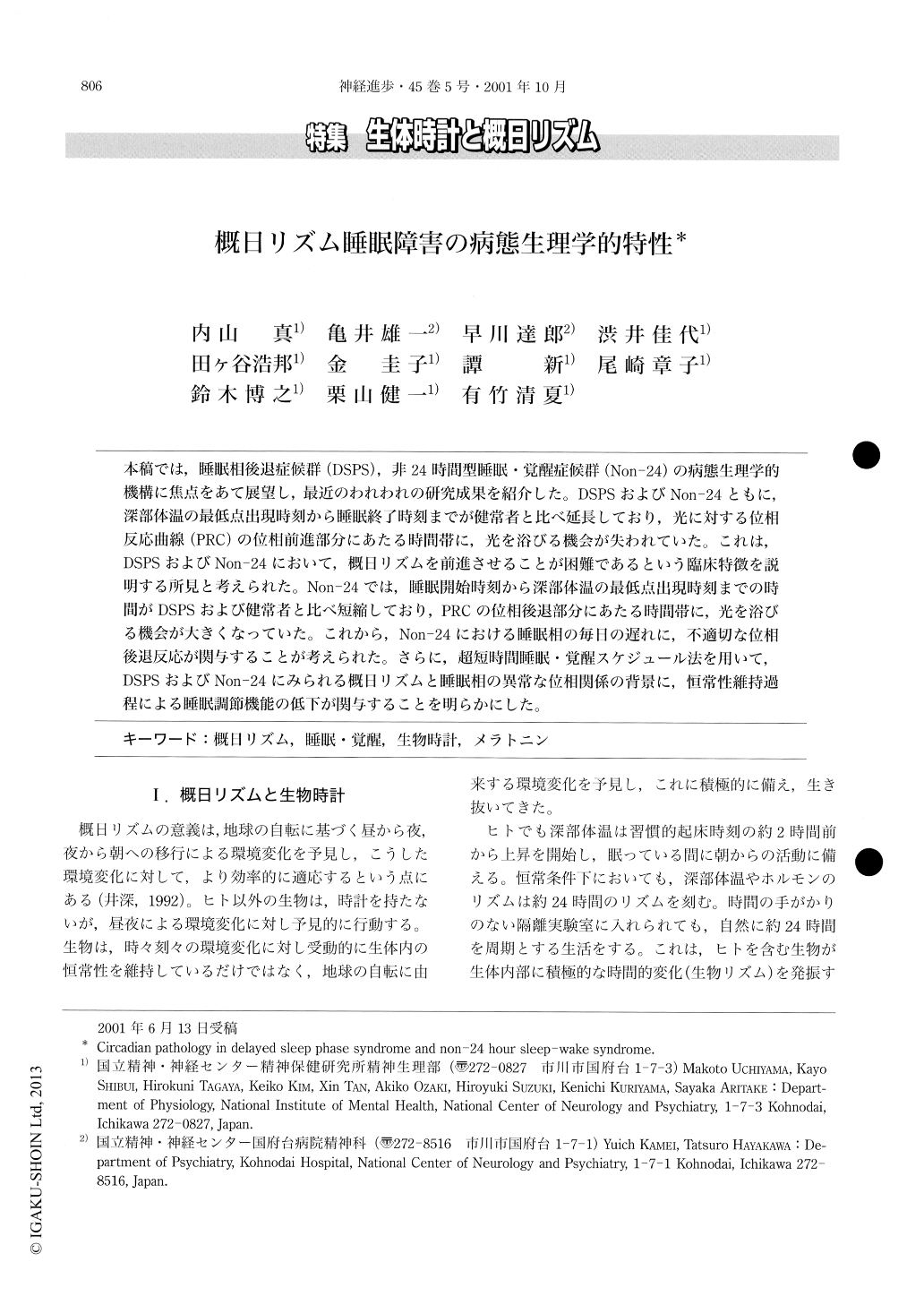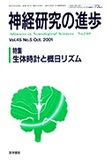Japanese
English
- 有料閲覧
- Abstract 文献概要
- 1ページ目 Look Inside
本稿では,睡眠相後退症候群(DSPS),非24時間型睡眠・覚醒症候群(Non-24)の病態生理学的機構に焦点をあて展望し,最近のわれわれの研究成果を紹介した。DSPSおよびNon-24ともに,深部体温の最低点出現時刻から睡眠終了時刻までが健常者と比べ延長しており,光に対する位相反応曲線(PRC)の位相前進部分にあたる時間帯に,光を浴びる機会が失われていた。これは,DSPSおよびNon-24において,概日リズムを前進させることが困難であるという臨床特徴を説明する所見と考えられた。Non-24では,睡眠開始時刻から深部体温の最低点出現時刻までの時間がDSPSおよび健常者と比べ短縮しており,PRCの位相後退部分にあたる時間帯に,光を浴びる機会が大きくなっていた。これから,Non-24における睡眠相の毎日の遅れに,不適切な位相後退反応が関与することが考えられた。さらに,超短時間睡眠・覚醒スケジュール法を川いて,DSPSおよびNon-24にみられる概日リズムと睡眠相の異常な位相関係の背景に,恒常性維持過程による睡眠調節機能の低下が関与することを明らかにした。
Recent studies in clinical chronobiology have revealed that a chronic sleep phase delay (delayed sleep phase syndrome (DSPS) ), or a chronic free-running sleep-wake rhythm (non-24 hour sleep-wake syndrome (non-24) ) was observed in sighted subjects living under a normal light-dark cycle. The intensity or timing of environmental light is suspected to play an etiologic role in sighted patients suffering from DSPS or non-24. Though these disorders have been studied for about 20 years, there have been few hypotheses on their pathophysiology. Here, we review articles on DSPS and non-24 with special reference to the phase relation between sleep and the circadian pacemaker, together with documentation of our recent study which focused on the syndromes.
Our review of the recent literatures has revealed that an entraining mechanism of biological clock may be responsible for the clinical manifestation of DSPS and non 24, and that the assumed prolongation of tau (period) may be a main cause of these delayed syndromes. But, detailed pathophysiology or etiologic hypothesis has not been obtained except for Czeislers's deformed phase response curve theory on DSPS, in which less responsive advanced portion could explain the phase delay.
We propose a new hypothesis on the pathophysiology of DSPS and non-24 based on our recent studies. The aim of this hypothesis is to answer the question why the patient's circadian pacemaker fails to properly reentrain to a 24-hour cycle after the phase delay of a sleep episode, but not the question why the patient's sleep begins to be phase-delayed or to be free-running, because the modern life in industrial countries is filled with opportunities to sleep phase delay. We carried out simultaneous measurement of continuous rectal temperature (BT) and wrist activity on patients with DSPS and non-24 to clarify this issue. We found that sleep length and the interval from the body temperature trough (BT trough) to sleep offset were significantly longer in both non-24 and DSPS patients than in the controls, and that the interval between sleep onset and the BT trough was significantly shorter in the non-24 patients than in the DSPS patients and the controls.
We postulate these alterations in phase relation between sleep timing and core body temperature rhythm to be associated with phase changes of the circadian pacemaker via different illumination timings. The finding of a longer interval from BT trough to sleep-offset in non-24 and DSPS suggests that their inability to normally phase-advance their circadian rhythms may be a consequence of masking of the advance portion of their phase response curve by the last hours of their longer sleep episodes. The observation that the non-24 patients had a shorter interval between sleep onset and the BT trough than the DSPS patients and the controls indicates that the patient's phase-delay portion of the phase response curve to light might be inappropriately illuminated by light, leading to sleep-wake cycle that is longer than 24 hours. Moreover, we first found, by using a ultra-short sleep-wake schedule, that such alterations in phase angle between sleep timing and the circadian pacemaker in non-24 and DSPS may be caused by a poor compensatory function for sleep loss (a homeostatic regulation of sleep).

Copyright © 2001, Igaku-Shoin Ltd. All rights reserved.


